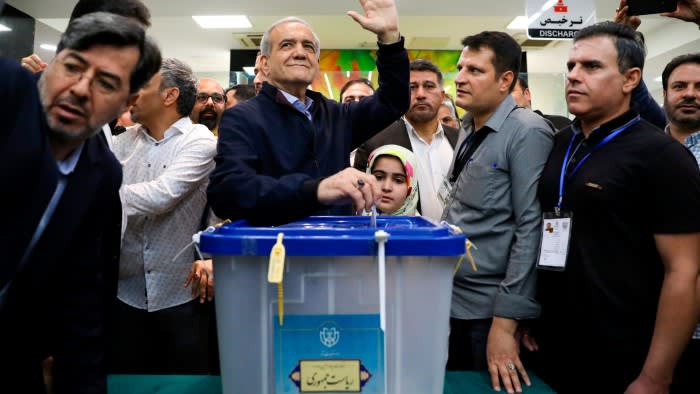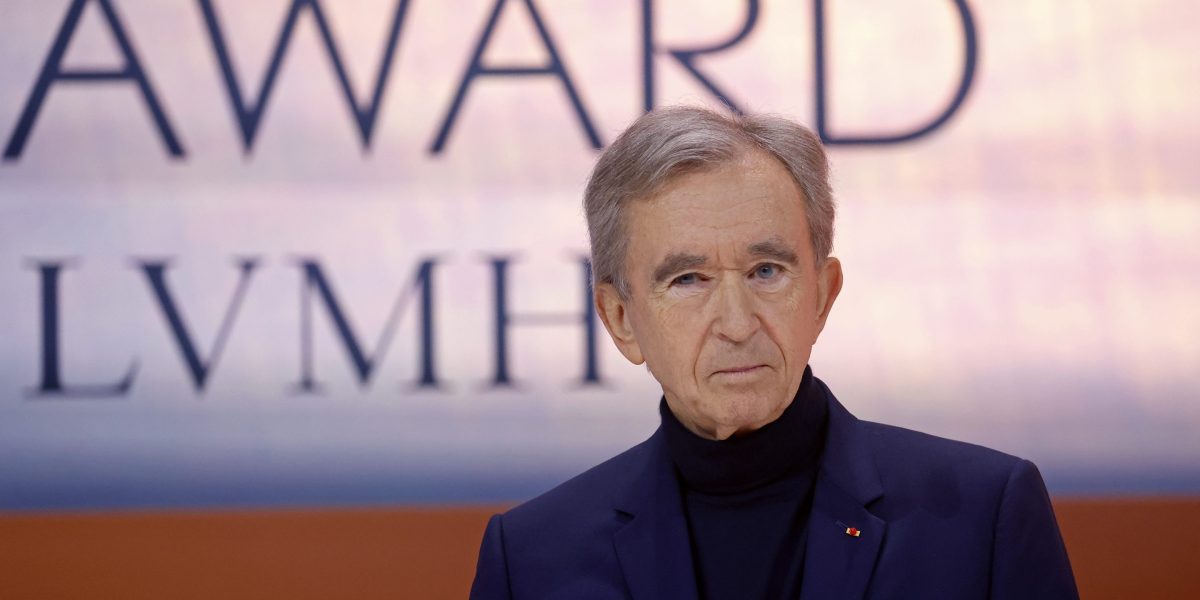Iran’s presidential poll was heading for a second round on Saturday with no candidate expected to garner half the votes in an election marred by a low turnout.
The run-off will offer voters a stark choice between a reformist promising to improve relations with the west and ease social restrictions, and a hardliner intent on consolidating conservatives’ grip on power.
With more than 19mn votes counted, Masoud Pezeshkian, a reformist former health minister, was ahead of Saeed Jalili, a regime stalwart who was the most ideologically hardline of three conservative candidates running, according to the interior ministry.
But the low turnout will dominate political discourse ahead of Friday’s second round, with the absence of voters sending a stinging rebuke to the Islamic republic — both reformers and hardliners within the system. Provisional estimates by state-affiliated media put turnout at about 40 per cent of the 61mn eligible voters, which would be a record low.
Ayatollah Ali Khamenei, the supreme leader, said on Friday that a high turnout was an “absolute necessity” and that Iran’s “durability, stability, honour and dignity in the world” depended on people’s votes.
The election comes at a crucial time for the regime amid heightened tensions with the west triggered by the Israel-Hamas war and Tehran’s expansion of its nuclear programme. The republic is also preparing for the eventual succession to supreme leader when Khamenei, 85, dies.
The emergency vote was held after hardline president Ebrahim Raisi, a cleric and potential successor to Khamenei, died in a helicopter crash last month.
Reformist politicians had been energised by the authorities’ surprise decision to allow Pezeshkian’s candidacy after the presidential election in 2021 and this year’s parliamentary poll saw leading reformist and centrist contenders barred from competing.
But many voters who would typically back a reformist candidate have grown increasingly disillusioned with their leaders, angered by the country’s economic malaise, social restrictions and isolation from the west. They have given up on the notion that change can come from within the regime and are loath to be seen to be legitimising the theocratic system through the ballot box.
The mood darkened after the 2021 presidential vote that brought Raisi to power, with many believing the result was preordained as leading reformists were prevented from competing. Turnout at that election was 48 per cent, the lowest for a presidential poll since the 1979 Islamic revolution.
The following year, mass anti-regime protests erupted after Mahsa Amini, 22, died in police custody after being arrested for allegedly not wearing her hijab properly. This year, social media campaigns have urged people not to vote, saying it would be a betrayal of those killed during the crackdown on demonstrations.
As a result, not voting has become a form of silent protest against the regime in a nation with a youthful population.
“Iranian society has completely transformed since 2022 [since the Amini protests],” said Mohammad-Reza Javadi-Yeganeh, a sociologist, in a post on X. “Neither the theoretical frameworks nor previous methods of opinion polls are capable of understanding the new society.”
Reformist politicians will cling to the hope that in a run-off between Pezeshkian and Jalili, more Iranians will be mobilised to go to the polls.
Pezeshkian, 69, has promised to revive negotiations with the US to resolve Tehran’s nuclear stand-off with the west and secure sanctions relief, while also suggesting he would ease social restrictions, including a more relaxed stance towards compulsory hijabs for women.
But Jalili, 58, will be betting that his chances are bolstered now that he is the sole hardliner running and hoping that the conservative base will unite around him.
Typically, hardline candidates withdraw from the race to rally behind the leading candidate shortly before voters go to the poll. This time, however, neither Jalili, nor Mohammad Bagher Ghalibaf, the other leading hardliner who was trailing in third, were willing to step aside despite pressure from within their camp, splitting the conservative vote.
If Jalili is victorious, analysts warned that he would enforce social restrictions more rigorously and be more hostile to any engagement with the US or other western powers.
While Pezeshkian, and even Ghalibaf, suggested they would be open to negotiations with the west, Jalili told supporters that he would “use the existing economic potential to make the enemy regret imposing sanctions [on Iran]”.
Although important foreign policy and domestic decisions are determined by the supreme leader, the president can influence the tone of government both in the republic and in its foreign engagements.
But the challenge for Pezeshkian will be convincing wary Iranians that he can make a difference as president in a system where the supreme leader has ultimate authority and elected and unelected hardline centres of power, including the elite Revolutionary Guards, have significant sway over foreign and domestic policy.
“We don’t see any reason for voting,” said Saba, a 22-year-old student. “No one can change things, they [the president] are just a small part of a big circle and no one can change it.”



